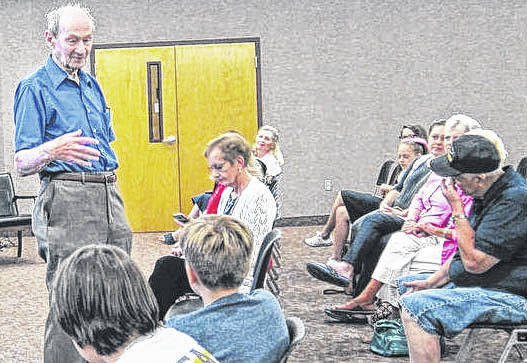The message brought by Holocaust survivor Zev Harel was simple: “Do all the good things you can do.”
Originally from a small village in the region of central Romania formerly known as Transylvania, the 89-year-old Harel, spoke recently at the nearly full Osterneck Auditorium of the Robeson County Public Library. He learned the lesson about doing good things during the depths of one of the worst tragedies of the modern world.
In the infamous Auschwitz concentration camp in 1944, one line of people led to the gas chambers and another line to the labor camp. To live and work, prisoners had to be 15 years old, and Harel was 14.
“A Nazi SS guard pulled me aside and asked my age,” Harel said. “When I answered 14, he said, ‘Don’t tell anyone you are 14.’ I became 17.”
The Wafen-SS were an elite German military branch, the members of which were renowned for committing some of the worst atrocities in occupied territories. The group contributed greatly to the extermination of 6 million Jews and many others.
“If that SS guard had not told me that, I would not be here,” Harel said. “In every evil contingent, not everyone is evil.”
That lesson would repeat itself and remain etched in a young man’s world view. Harel’s first job at Auschwitz was making an underground tunnel through solid rock.
“It was very hard work, but you can do whatever you want to do,” he said. “At age 14, I decided I could do it.”
Harel’s second job was cleaning out a barn at a guest house. Once again, good people rose up to help him survive.
“Lucky for me, the daughter of the owner fed me,” Harel said. “This was a righteous person at age 13 or 14.”
In May 1945, the U.S. 3rd Calvary arrived to liberate the camp. They threw open the door, and prisoners who were mostly skin and bone walked out.
“We started walking out,” Harel said. “I had gotten typhoid and fell into a ditch. That’s the last thing I remember until waking up in a hospital.”
Harel was told he was picked up by a black U.S. serviceman and carried to get medical help. It was the third time he had been saved by a “righteous person.”
“It’s so important to identify and honor the righteous persons,” Harel said.
Likewise, it is important to punish the guilty, he said.
Harel sent the girl who fed him a present on her wedding day. Despite considerable effort that involved U.S. Sen. John Glenn, he could never find the black serviceman who helped him.
Harel confronted a school principal who abused Jewish students and was able to get him removed from his position.
Harel’s education to that point consisted of four years at his village school. Ultimately, he earned a doctorate degree and taught for 40 years at Cleveland State University.
But education and immigration to American would have to wait. President Franklin Roosevelt would not allow Holocaust survivors to come to the United States, and it was not until 1949 that that policy was loosened.
After the war, Harel learned his family was all but erased, and he began working to establish the new Jewish state in Palestine. He joined the elite Harel’s Brigade in the successful 1949 Israeli War of Independence. He took the name Harel in honor of the brigade.
In 1965, working as a truck driver at an Israeli collective, Harel was recommended for a job as a youth educator. That job ignited his own education.
“I earned a high school diploma at 30, a fellowship to graduate school at the University of Michigan at 35 and a Ph.D. at 41,” he said.
Harel has published more than 100 academic papers and co-authored several books about his experiences. At Cleveland State, he started a Holocaust remembrance program and a community forum on the needs of African-American seniors.
Upon moving to North Carolina, Harel continues to give talks on the Holocaust and participate in programs of remembrance.
He believes it is important to remember, and he has drawn powerful lessons that he continues to share.
During a question-and-answer period after Harel’s talk, he was asked if what happened in Nazi Germany could happen here.
“Do not ever believe it cannot happen here,” he said. “Be vigilant.”
Asked how he was able to start over again after what he had witnessed and experienced, Harel said he learned about the power of the human will.
“The human capacity to endure and rebound is extraordinary,” he said. “Anything you want to do, you can do.
“Life means you may make a mistake. Correct it, and do all the good you can do.”
Adult Services librarian Lauren Piszczor coordinated the program.
“I am always interested in bringing educational programs, and I thought he would be great,” Piszczor said.
Reach Scott Bigelow at 910-644-4497 or bigelow@yahoo.com.

